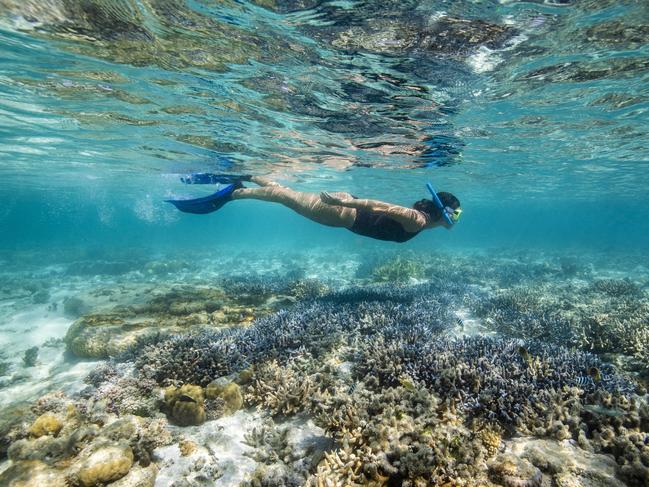Scientists and tourism operators concerned negative perceptions of Great Barrier Reef hindering resilience efforts
Scientists and tourism operators are concerned negative perceptions of Great Barrier Reef are keeping visitors away, and that their absence might actually be hindering its resilience.
QLD News
Don't miss out on the headlines from QLD News. Followed categories will be added to My News.
Tourism operators on the Great Barrier Reef are warning that negative perceptions of the natural wonder are scaring off visitors, with many expecting to see a coral graveyard when they dive.
It comes amid controversy over the federal government’s handling of a positive report on the Reef’s health.
According to the latest Summer Snapshot report from the Great Barrier Reef Marine Park Authority (GBRMPA), coral was at record levels in the northern and central parts of the Great Barrier Reef just prior to the 2022/23 summer.
Passions of Paradise CEO Scotty Garden said that tourists have been led to believe it is currently a wasteland.

“I had an American tourist say to me he thought he was coming to see a coral graveyard,” he said.
Mr Garden argued that the sustainable tourism his company has been engaged in for over 30 years is the key to educating the public on the Reef’s challenges.
“These projects need vessels to do their research and we can get tourists involved in that conservation work, it’s citizen science.”
The marine park authority’s Tourism Reef Protection Initiative has contracted 26 Great Barrier Reef tourism operators, including Passions of Paradise, to deliver Reef protection and conservation services.
The 2022/23 Summer Snapshot revealed minor bleaching was evident throughout the Reef, but this was a marked turnaround from the previous summer, when bleaching was reported on 91 per cent of all reefs surveyed. That statistic was widely reported around the world.
Mild conditions in summer – despite the warmest spring on record – and the relative absence of cyclones enabled many patches of coral to recover.

Quicksilver Group’s environment and compliance manager and marine biologist Doug Baird said tourism played an essential role in the Reef’s relevance to secure research and conservation funding.
“Without the support of the public, you’re not going to get that political will to fund a lot of the research … getting tourists writing to their MPs does have a lot more power than researchers writing,” he said.
Mr Baird said it was undeniable that the Reef is facing challenges such as climate change, illegal fishing and run-off pollution.
However he wants to shift the Reef narrative away from projections on its future and toward resilience to highlight and encourage intervention strategies.
“It’s not all doom and gloom and despair anymore … this is the best managed reef system anywhere on the planet.”
John and Jenny Edmondson run Wavelength Cruises in Port Douglas and say eco-tourism plays a crucial role in Reef conservation.
“If you visit and you put your head in the water (you’re) looking at a completely natural environment with more biodiversity than you’ve seen in the whole of your life,” said Mr Edmondson.
“You get a bond with it and you’re much more likely to take notice of policies that may be being discussed about the wider solutions to its problems that affect everybody.”
Wavelength Cruises conducts weekly Reef health impact monitoring, crown-of-thorns starfish removal and coral planting programs to bolster resilience ahead of potential cyclones or bleaching events.
“We’ve had a really good five years of growing conditions … it’s not like it was 20 years ago but it’s vastly better than it has been for the last eight years.”
Last year the Australian government rejected suggestions the Reef should be listed as in danger of losing its UNESCO World Heritage listing.
Mr Baird said the in-danger rating could have been positive if it had been leveraged to motivate government action on climate change.





